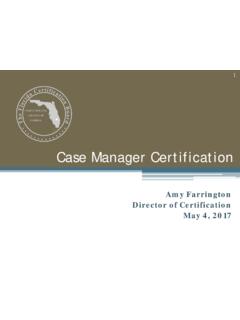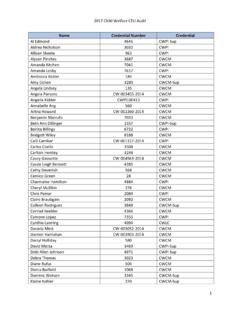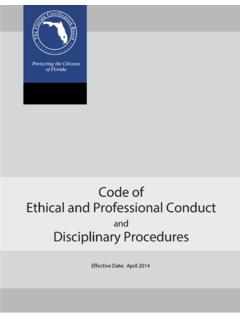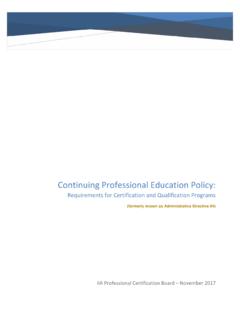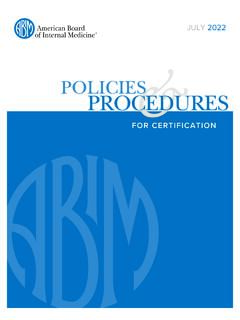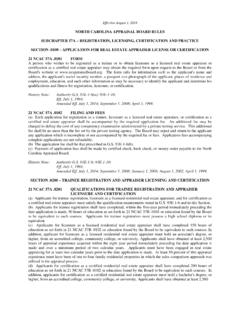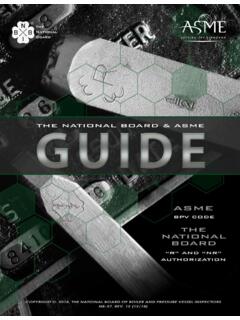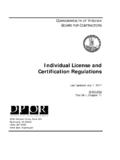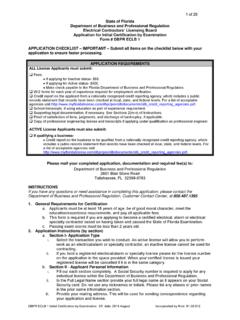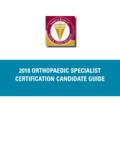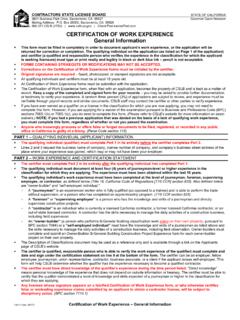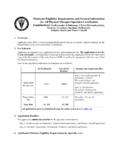Transcription of Code of Ethics - Florida Certification Board
1 Code of Ethical and Professional Conduct and Disciplinary ProceduresEffective Date: April 2014 Contents 2 Glossary .. 2 Rules of Ethical and Professional Conduct .. 4 1. Professional Standards .. 4 2. Criminal Activity .. 5 3. Sexual Misconduct .. 5 4. Fraud-Related Conduct .. 5 5. Exploitation of Consumers .. 6 6. Safety & Welfare .. 7 7. Records Management .. 7 8. Cooperation with the Board .. 8 Disciplinary Procedures .. 9 Confidentiality of Proceedings .. 9 Oversight and Conflict of Interest .. 9 Code of Ethics Sanctions .. 10 The Complaint Process .. 11 The Investigation Process .. 12 Consent Order .. 12 Action by the Ethics Committee .. 13 The Appeal Process .. 14 Reinstatement following Disciplinary Action .. 16 Reports to Other Agencies .. 16 1 | Page Introduction FCB is dedicated to the principle that health and human services professionals must demonstrate the high standards of ethical conduct and professional practice.
2 To that end, the FCB has adopted this Code of Ethical and Professional Conduct. Agreement to follow the Code of Ethical and Professional Conduct is a requirement of Certification . The FCB is committed to investigate and sanction those certified professionals who violate this Code. It is the responsibility of the certified professional to become thoroughly familiar with the FCB Code of Ethics and guide their professional behavior accordingly. The most recent version of the FCB Code of Ethical and Professional Conduct and Disciplinary Procedures are maintained and available for download at The FCB will notice certified individuals of changes to the FCB Code of Ethical and Professional Conduct and Disciplinary Procedures; however, it is the responsibility of the certified individual to comply with the most current standards. Glossary Advisory Council: A standing committee of certified professionals who assist the FCB in meeting its mission by providing feedback and recommendations from representatives of the certified population to the Board of Directors for their approval and action.
3 Appeal Hearing: A formal hearing conducted when a respondent appeals the decision of the Board of Directors. Applicant: A person who has submitted an Application for Certification but is not yet certified. Certified Professional: Any person who holds any credential issued by the FCB. Clear and Convincing Evidence: Evidence presented is credible and verifiable, and that memories of witnesses are clear and without confusion. The evidence must create a firm belief and conviction of the truth of the facts presented and, considered as a whole, must convince the FCB Board of Directors without hesitancy that the applicant will not pose a threat to the safety and/or well-being of others, especially potential clients. Clear and convincing evidence is a heavier burden that the preponderance of the evidence standard but less than beyond a reasonable doubt. Code of Ethics : The FCB Code of Ethical and Professional Conduct and Disciplinary Procedures that applies to all applicants and certified professionals.
4 Complainant: A person who files a formal complaint against an applicant or certified professional. Consent Order: A voluntary agreement worked out between the Respondent and the FCB that carries the same weight as a final decision by the Board of Directors. Consumer: A person seeking or receiving services from an applicant, a certified professional or the applicant/certified professional s employer. 2 | Page Ethical Complaint: A formal notice to the FCB alleging that an applicant or certified individual violated the FCB Code of Ethics . Ethics Committee: A standing committee of the Advisory Council responsible for implementing the FCB Code of Ethical and Professional Conduct and Disciplinary Procedures. Ethics Complaint: A formal allegation of a violation of one or more Rule(s) of the FCB Code of Ethics . Fraudulent Claim: A fraudulent claim includes but is not limited to charging a consumer or a third-party payer for a service not performed or submitting an account or charge for a service that is false or misleading.
5 It does not include charging for a missed appointment. Hearing Committee: A committee convened by the FCB Board of Directors to hear, consider, and make recommendations when a respondent appeals the decision of the Advisory Council s Ethics Committee. Hearing Officer: A non-voting member of the Hearing Committee who presides over the Appeal Hearing. Immediate Family: A spouse, child, parent, parent-in-law, sibling, grandchild, grandparent or other household members of the certified professional. Probative Value: Evidence or facts which tend to prove the existence of other facts of issues. Respondent: The applicant or certified professional who is the subject of a formal complaint alleging a violation of the Code of Ethics . Revocation: A sanction resulting in the complete forfeiture of FCB Certification . Rules: Standards of ethical and professional conduct that apply to all certified professionals. Sanction: A penalty intended to enforce compliance with the Code of Ethics .
6 Sexual Misconduct: Engaging, attempting to engage, or offering to engage in any behavior, whether verbal or physical, which is intended to be sexually arousing, including kissing; touching breasts, genital areas, buttocks, or thighs, whether clothed or unclothed; any form of intercourse; or any form of oral sex. Certified professionals are prohibited from sexual misconduct with a consumer, even if the consumer is not assigned to the certified professional and /or a supervisee. Summary Suspension: An immediate suspension of a certified individual s credential(s) or application for Certification when a preponderance of the evidence contained in the ethical complaint supports emergency action while the case is being investigated. Supervisee: An individual that works under the direct supervision of a certified professional. Suspension: A sanction resulting in the temporary forfeiture of FCB Certification for a specified period of time.
7 Written Reprimand: A sanction that is a formal, written document expressing disapproval and/or providing a warning in regard to the Respondent s behavior. 3 | Page Rules of Ethical and Professional Conduct The FCB Code of Ethics set forth the rules of ethical and professional conduct which all applicants and certified professionals are expected to honor (hereafter referred to as the Rules ). Failure to comply with an obligation or prohibition set forth in the Rules will result in disciplinary action. Discussion sections accompany some of the Rules. These discussions are intended to interpret, explain, or illustrate the meaning of the Rules, but the Rules themselves remain the authoritative statements of the conduct for which disciplinary action may be imposed. 1. Professional Standards An applicant or a certified professional shall meet and comply with all terms, conditions, or limitations of any professional credential they hold.
8 An applicant or a certified professional shall not perform services outside of their area of training, expertise, competence, or scope of practice. Discussion of Rule : When a consumer's therapeutic issues are outside their level of professional functioning or scope of practice, the certified professional must refer the consumer to another professional who will provide the appropriate therapeutic approach for the consumer. An applicant or certified professional shall not in any way participate in discrimination on the basis of race, color, sex, sexual orientation, age, religion, national origin, socio-economic status, political belief, psychiatric or psychological impairment, physical disability, or the amount of previous therapeutic or treatment occurrences. An applicant or certified professional shall place their application or credential(s) on inactive status for any mental, physical, or behavioral health related adversity that interferes with their professional functioning.
9 Discussion of Rule : The private life of an applicant or certified professional remains a personal matter to the same degree as any other person. However, when a personal issue begins to adversely affect professional performance, affecting the quality of service delivered and thus putting the consumer at risk, the applicant or certified professional must take sufficient and timely action to resolve any adversity that interferes with their professional functioning. An applicant or certified professional shall not practice during the period of any denial, suspension, revocation, probation, or other restriction or discipline on Certification , license, or other authorization to practice issued by any Certification authority or any state, province, territory, tribe, or the federal government. An applicant or certified professional must maintain a high standard of ethical and professional conduct. The moral, ethical and legal standards of behavior of the certified professional are a personal matter to the same degree as they are for any other citizen, except as these may compromise the fulfillment of their professional responsibilities or reduce the public trust in applicants or certified professionals.
10 4 | Page 2. Criminal Activity An applicant or certified professional shall report all arrests and case disposition, regardless of adjudication to any felony or first degree misdemeanor crime. Such report must be received within 72 hours of release from any state or federal confinement. Discussion Rule : Any public record pertaining to an arrest, charge, disposition or sentencing of a certified professional shall be deemed as conclusive evidence of guilt of the felony or misdemeanor for which he or she has been convicted. If that felony or misdemeanor relates to the individual's ability to practice in the credentialed discipline, the fact of conviction shall also be proof of violation of this Rule. All proceedings in which the sentence has been deferred, suspended, adjudication withheld, or a conviction expunged shall be deemed a conviction within the meaning of this section. An applicant or certified professional shall not use, possess, or sell any unprescribed or illegal substance.

